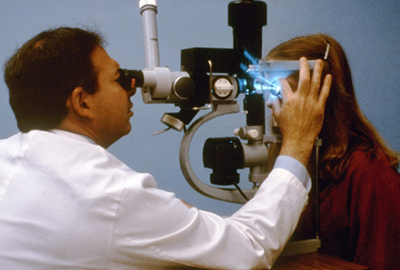Laser Treatment for Narrow Angle Glaucoma
A Laser Peripheral Iridotomy (LPI) is the most common treatment for narrow angle glaucoma. When the angle between the iris and the cornea narrows and fluid is unable to drain properly, a laser is used to make a small hole in the iris, the colored part of your eye. This laser relieves the intraocular pressure and helps the fluid drain more normally.
If you require a laser peripheral iridotomy, your highly skilled glaucoma specialist will numb your eye with drops, and give you a drop to constrict your pupil for the procedure. Your glaucoma specialist will also place a contact lens on your eye to help focus the laser. The procedure takes only a few minutes and is performed in the office. You may experience a slight pinching sensation and you will also see a bright light. It is this bright light that produces a pinhead-sized hole in your iris. You will feel little or no discomfort, and you will notice flashes of bright light during the procedure.
Following the surgery, your vision may be blurry but gradually improve. You will not be able to drive home following the treatment. Therefore, you should make transportation arrangements. Your vision may be dim for the rest of the day, due to the constricted (smaller) pupil. It will be clearer the following day. Tylenol may be used after the laser if there is any discomfort that day. Avoid Aspirin, or NSAIDs, such as Ibuprofen.
The laser peripheral iridotomy is a safe and effective treatment to prevent the blindness that can be caused by narrow angle glaucoma. It should be considered surgery and it does carry some risks. It may be necessary to do more than one treatment, and other procedures may be required, particularly if the iris is difficult to penetrate. Some bleeding in the iris may also result, and you may be required to take medication following the procedure. The expected benefits of preserving your vision offset these risks.

